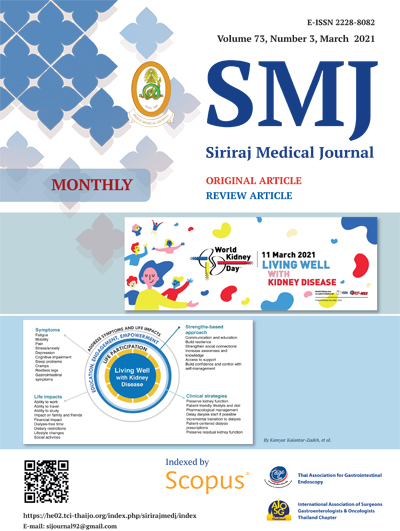Factors Predicting Fatigue in Pulmonary Tuberculosis Patients Receiving Anti-Tuberculosis Drugs
DOI:
https://doi.org/10.33192/Smj.2021.22Keywords:
Depression, fatigue, nutritional status, pulmonary tuberculosis patients, sleep qualityAbstract
Objective: To explore the predictive factors on fatigue among pulmonary tuberculosis patients receiving anti-tuberculosis drugs.
Methods: This study is a predictive correlational research designed. The sample was comprised of 125 patients at the out-patient department, a tertiary hospital in Bangkok setting. The data were collected between January to February 2020. The questionnaires included mini-cognitive assessment instrument (Mini-Cog); the demographic characteristics questionnaire; Piper fatigue scale-12 (PFS-12); Nutrition alert form (NAF); the Pittsburgh sleep quality index (PSQI); and the Center for epidemiologic studies depression scale (CES-D). All data were analyzed by using descriptive statistics and multiple regression analysis.
Results: The sample had a mean age of 58.45 years (SD = 15.374) of which 60.8% were males. Overall, the mean score of fatigue was a moderate level (Mean = 4.90, SD = 2.455). From the multiple regression analysis, age, nutritional status, sleep quality, and depression could explain the variances on fatigue in the sample group as 52.5% (R2 = .525, F = 33.119, p < .001). Nutritional status, sleep quality, and depression are the variables found to be capable in predicting fatigue of pulmonary tuberculosis patients with statistical significance (β = .316, p < .001, β = .226, p < .05 and β = .340, p < .001).
Conclusion: Nutritional status, sleep quality, and depression could affect fatigue. Healthcare teams should assess patients to prevent and manage the aforementioned symptoms to reduce suffering from fatigue and a better quality of life.
References
2. Bureau of Tuberculosis, Department of Disease Control, Ministry of Public Health. National Tuberculosis control Programme Guidelines, Thailand, 2018. Bangkok: Aksorn graphic and design, 2018.
3. Siriraj Hospital. Tuberculosis Patient Statistics. Bangkok: Medical Statistics Unit, Medical Record Division, Siriraj Hospital, 2019.
4. Babiarz KS, Suen S-c, Goldhaber-Fiebert JD. Tuberculosis treatment discontinuation and symptom persistence: an observational study of Bihar, India’s public care system covering >100,000,000 inhabitants. BMC Public Health. 2014;14(1):418.
5. Raftery A, Tudor C, True L, Navarro C. Nursing Guide for Managing Side Effects to Drug-resistant TB Treatment. Geneva: International Council of Nurses and Curry International Tuberculosis Center; 2018.
6. Sevim T, Aksoy E, Ataç G, Ozmen I, Kapakli N, Horzum G, et al. Treatment adherence of 717 patients with tuberculosis in a social security system hospital in Istanbul, Turkey. The International Journal of Tuberculosis and Lung Disease. 2002;6(1):25-31.
7. Hafez SA, Elhefnawy AM, Hatata EA, El Ganady AA, Ibrahiem MI. Detection of extensively drug resistant pulmonary tuberculosis. Egyptian Journal of Chest Diseases and Tuberculosis. 2013;62(4):635-46.
8. Piper BF, Lindsey AM, Dodd MJ. Fatigue mechanisms in cancer patients: developing nursing theory. Oncology Nursing Forum. 1987;14(6):17-23.
9. Polit DF, Beck CT. Nursing Research: Generating and Assessing Evidence for Nursing Practice. Philadelphia: Williams & Wilkins; 2017.
10. Mootoo A, Stylianou E, Arias MA, Reljic R. TNF-alpha in tuberculosis: a cytokine with a split personality. Inflammation & Allergy Drug Targets. 2009;8(1):53-62.
11. Raftery A, Tudor C, True L, Navarro C. Nursing Guide for Managing Side Effects to Drug-resistant TB Treatment. Geneva: International Council of Nurses and Curry International Tuberculosis Center; 2018.
12. Fleischer M, Hinz A, Brahler E, Wirtz H, Bosse-Henck A. Factors associated with fatigue in sarcoidosis. Respiratory Care. 2014;59(7):1086-1094.
13. Carrion-Barbera I, Salman-Monte TC, Castell S, Castro F, Ojeda F, Carbonell J. Prevalence and factors associated with fatigue in female patients with systemic lupus erythematosus. Medicina Clinica. 2018;151(9):353-8.
14. Gholami K, Kamali E, Hajiabdolbaghi M, Shalviri G. Evaluation of anti-tuberculosis induced adverse reactions in hospitalized patients. Pharmacy Practice 2006;4(3):134-138.
15. Kalinda AS, Aldrich CC. Pyrazinamide: a frontline drug used for tuberculosis. Molecular mechanism of action resolved after 50 years? ChemMedChem. 2012;7(4):558-60.
16. Lewko A, Bidgood PL, Garrod R. Evaluation of psychological and physiological predictors of fatigue in patients with COPD. BMC Pulmonary Medicine. 2009;9(1):1-11.
17. Berger AM, VonEssen S, Kuhn BR, Piper BF, Agrawal S, Lynch JC, et al. Adherence, sleep, and fatigue outcomes after adjuvant breast cancer chemotherapy: results of a feasibility intervention study. Oncology Nursing Forum. 2003;30(3):513-522.
18. Turner RD, Bothamley GH. Cough and the transmission of tuberculosis. The Journal of Infectious Diseases. 2015;211(9):1367-1372.
19. Plubplatong T, Wannapornsiri C, Siripornpibul T, Tansupasawadeekun S. Self- Care Experience in Successful Treatment of Ageing Tuberculosis Patients. Journal of Nursing and Health Sciences. 2556;7(3):68-78.
20. Kentson M, Todt K, Skargren E, Jakobsson P, Ernerudh J, Unosson M, et al. Factors associated with experience of fatigue, and functional limitations due to fatigue in patients with stable COPD. Therapeutic Advances in Respiratory Disease. 2016;10(5):410-424.
21. Azizoddin DR, Gandhi N, Weinberg S, Sengupta M, Nicassio PM, Jolly M. Fatigue in systemic lupus: the role of disease activity and its correlates. Lupus. 2019;28(2):163-173.
22. Aistars J. Fatigue in the cancer patient: a conceptual approach to a clinical problem. Oncology Nursing Forum. 1987;14(6):25-30.
23. Datiko DG, Jerene D, Suarez P. Stigma matters in ending tuberculosis: Nationwide survey of stigma in Ethiopia. BMC Public Health. 2020;20(1):190-199.
24. Dasa TT, Roba AA, Weldegebreal F, Mesfin F, Asfaw A, Mitiku H, et al. Prevalence and associated factors of depression among tuberculosis patients in Eastern Ethiopia. BMC Psychiatry. 2019;19(1):82-88.
25. Dinsorkeaw W, Jitpanya C. Factors Related to Fatigue in Patients with MechanicalVentilators Admitted in Intensive Care Units. Thai Journal of Cardio-Thoracic Nursing. 2012;23(1):44-54.
Downloads
Published
How to Cite
Issue
Section
License
Authors who publish with this journal agree to the following conditions:
Copyright Transfer
In submitting a manuscript, the authors acknowledge that the work will become the copyrighted property of Siriraj Medical Journal upon publication.
License
Articles are licensed under a Creative Commons Attribution-NonCommercial-NoDerivatives 4.0 International License (CC BY-NC-ND 4.0). This license allows for the sharing of the work for non-commercial purposes with proper attribution to the authors and the journal. However, it does not permit modifications or the creation of derivative works.
Sharing and Access
Authors are encouraged to share their article on their personal or institutional websites and through other non-commercial platforms. Doing so can increase readership and citations.















